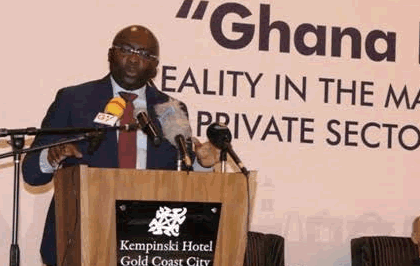Ghana’s economy is in the right hands – Bawumia

Ghana’s recent ratings by the Standards and Poor indicating that the economy has improved from a B – status to a solid B, with a stable outlook, is a confirmation that we’re in the right direction, Vice President Dr Mahamudu Bawumia, said Tuesday.
He explained: “We’re not where we want to be, but we believe that we’re on course. Our commonly known macroeconomic indicators-inflation rate, interest rate, exchange rate may hover around, moving ups and downs and buffeted by occasional headways from domestic and external causes.
“But as all good sailors know, rough and turbulent seas are no indication that you’re not sailing well, but what is most important is to know where you’re, and whether you’re sailing a seaworthy path”.
Dr Bawumia said since the Nana Akufo-Addo-led Government took over the administration of the country, the economy had experienced positive outcomes, with the growth rate moving from 3.7 per cent in 2016 to 8.5 per cent at the end of 2017.
Opening this year’s Ghana Industrial Summit and Exhibition, the Vice President said
Agricultural growth was trending upward, while industrial growth rate moved from a negative half per cent in 2016 to 17.7 per cent at the end of 2017.
Additionally, the Vice President said, the inflation rate continued to decline from 15.4 per cent in 2016 to the current rate of 9.9 per cent.
The Treasury Bill Rate had declined, while the country’s trading position was significantly strengthening, he said.
Also, the Gross International Reserves now covers 3.9 months of imports.
The debt to Gross Domestic Product (GDP) ratio has also declined from 73 per cent in 2016 to 64.4 per cent, as at June this year.
The Vice President emphasised: “So be rest assured, this economy is in good hands, we’re striving for a low inflationary rate, a low interest rate environment, a stable and predictable external value of the cedi”.
Standards and poor is an international rating agency.
The Association of Ghana Industries (AGI) is organising the three-day Industrial Summit, in
Accra , under theme: “International Partnerships for Value-Added Industrial and Local Content Development”.
It is providing a platform for policy-makers, captains of industry and entrepreneurs to discuss pressing national economic issues and proffer workable solutions to them.
It also enables businesses and entrepreneurs to showcase their products, network and form partnerships for economic development.
Vice President Bawumia thus used the platform to outline the Government’s seven key pillars for building a strong and resilient economy with the private sector as the engine of growth.
They are: Restoring and maintaining a strong macroeconomic environment; Developing the capacity of the human capital; Ensuring compliance with the Local Content Law; and Finding solutions to the energy challenges; Reducing the cost of credit; Enhancing port efficiency; and Formalising the economy through digitization.
He said it was the Government’s priority to build strong fundamentals for the economy, which would lead to a stable and predictable macro-economic environment for the private sector to thrive.
He said the government was building a stable and resilient economy that could withstand both internal and external shocks and striking the right balance between fiscal consolidation and growth, saying; “We’re putting in place measures to ensure the irreversibility of the economic gains achieved so far”.
The Vice President assured that the nation would move from the export of raw materials and add value to the agriculture products, citing the “One-District, One Factory” initiative.
Strategically, he said, value would be added to mineral resources.
To that end, a Legislation had been enacted by Parliament for the establishment of the Integrated Bauxite and Aluminium Development Corporation, which would spearhead the Integrated Bauxite and Aluminium Industry.
He said apart from the setting up of the bauxite and aluminium value chain, there was the need for coordination of activities such as the mining, smelting and downstream industry so that the Ghanaian would be ultimate beneficiary.
Vice President Bawumia announced that the Volta Aluminium Company Limited (VALCO) had been brought back to production thus, producing at 35 per cent of its capacity.
“We want to build an alumina refinery right here … so that we can mine and smelter bauxite and we have begun the process of selecting the partners for the alumina refineries, and we are hoping that by the end of the year, we can begin the process,” Dr Bawumia added.
He explained that refining bauxite locally would have multiplier effects and the nation stood to gain more benefits.
Source: GNA
